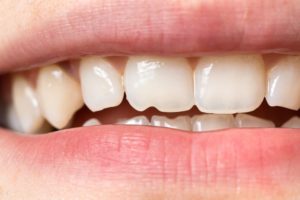About 20% of American adults suffer from a condition called acid reflux. This occurs when the acidic contents of the stomach move up and into the esophagus. Occasional heartburn, a burning sensation in the chest, affects most people at some point, but when this issue becomes chronic or severe, you could have gastroesophageal reflux disease (GERD).
Constant acid regurgitation can cause significant damage to your esophagus as well as your teeth. As this acid lingers in your mouth, it will eat away at the enamel, or outer layer, of your teeth. This type of dental damage is permanent, as enamel cannot regenerate once gone.
GERD is a leading cause of dental erosion, so those with a history of acid reflux may notice enamel damage. But a new study published in General Dentistry suggests that dental erosion might be the only noticeable symptom of GERD for many patients.
GERD does not always present with uncomfortable heartburn, but acid reflux will still hurt your teeth. If you have severe enamel erosion, you may want to speak to your doctor about your potential for GERD. Read on to learn more about the correlation between GERD and dental erosion.

How I Can I Tell If I Have Dental Erosion?
When enamel wears down, you might see some discoloration in the affected tooth. It may appear dark or translucent where the enamel has thinned and eroded. You may also feel tooth sensitivity or pain because nerves in the interior of the tooth become exposed without the protection of enamel.
However, many people might not easily recognize these symptoms until erosion becomes severe. You should visit your dentist for routine check-ups so that they can spot this type of damage and intervene before you experience major, irreversible harm to your smile.
How Will My Dentist Treat Enamel Erosion?
Tooth enamel cannot regrow, but your dentist can help you restore your dental structure after dental erosion. A dentist can use restorative dental tools to replace missing or weakened tooth enamel. For example, porcelain crowns, onlays, or veneers may be made to cover the affected areas of the teeth, improving comfort, dental health, function, and esthetics.
In Summary
Chronic dental erosion, as mentioned, might occur due to underlying medical concerns like GERD. If you suspect you have this disease, you should consult with your doctor.
Persistent dental erosion in patients already diagnosed with GERD can also be a sign that the disease is under-treated. If this is the case, you should speak to your doctor to find a better way to manage your condition.
Treating GERD through medication or lifestyle changes will help to reduce future damage to your teeth. So if you want to preserve your dental health, do not ignore these symptoms.
